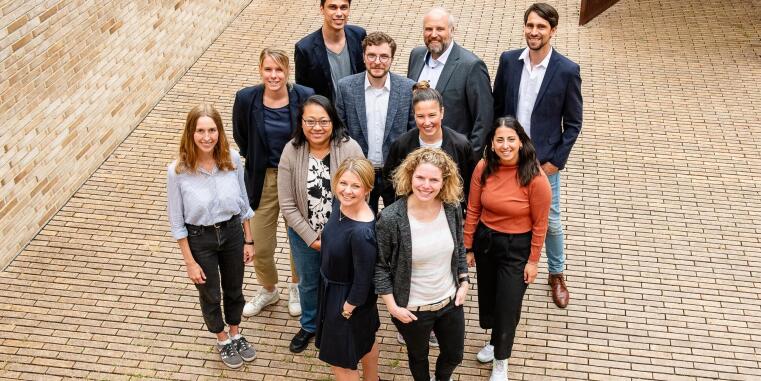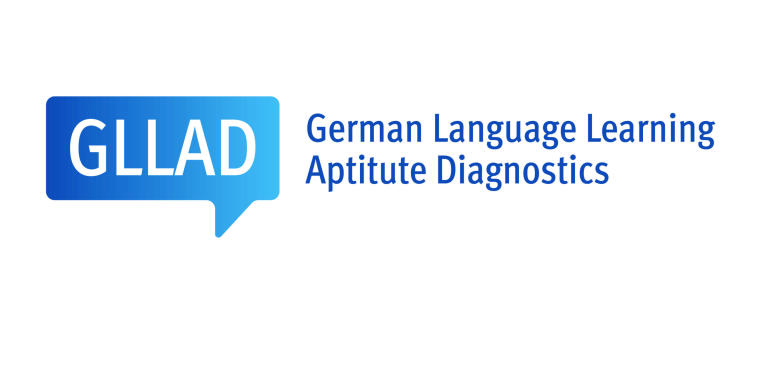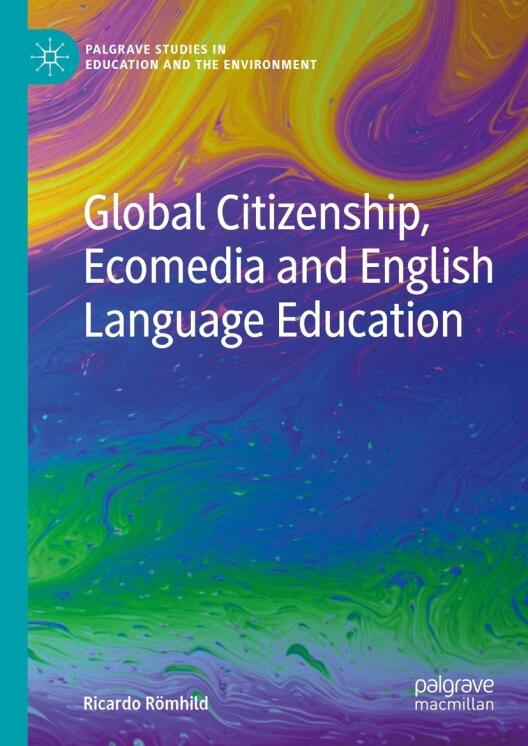











GLLAD is a language learning aptitude test for 6th graders with German as (one of their) first language(s). It measures five sub-dimensions of language learning aptitude:
The development of GLLAD is based on previous language learning aptitude tests (Granena 2020, Grigorenko & Sternberg 2000, Kiss & Nikolov 2005, Meara 2005, Carroll & Sapon 1958). The test items, reliability and construct validity are analysed using probabilistic methods.
The test is still under development. It has been piloted with more than 800 6th graders so far and will be published in 2025.
The project of GLLAD is funded by the Karg-Stiftung.
For more information on this promising project please visit the project website.
Call for Papers: Special issue of Journal for Media Literacy Education – Media Literacy in Language (Teacher) Education (download link)
Proposals are invited for articles for a special issue of the Journal of Media Literacy Education on the
theme of Media Literacy in Language (Teacher) Education. This special issue will focus on the role of
media literacies in the (foreign/second/additional/heritage) language classroom.
The use of digital media has long been part of the (foreign/second/additional/heritage) language
classroom as part of its focus on texts. In fact, media literacy is an established competence area in
many national language education curricula worldwide. With the advent of artificial intelligence and
the irreversibility of digitalization processes, research strands such as technology-enhanced language
learning (TELL) or computer-assisted language learning (CALL) have experienced a second spring in
recent years, although both look back at decades of scholarship and practice. Yet, the problem with
those approaches is in their names: technology or digital media are often seen as something that, if
added to the language learning process, might enhance it. Following Stalder, however, educators and
learners live in a digital condition. Digitality is not something that can be added to language learning,
rather, language learning happens in environments that have been profoundly shaped by digital
media.
There is a shift observable in the language education community: Influenced by impetuses, such as
the New London Group’s multiliteracies pedagogy or Kellner and Share’s critical media literacy
framework as well as longer-established critical theories that have their roots both in Frankfurt School
criticality and in Paulo Freire’s critical pedagogy, a paradigm shift seems to be under way.
Increasingly, scholars and practitioners are exploring ways to conceptualize and practice
(foreign/second/additional/heritage) language learning within digitality rather than about or with
digital media.
The Journal of Media Literacy Education provides a forum for established and emerging scholars,
media professionals, and educational practitioners in and outside schools. This special issue provides
space for theoretical, conceptual, and empirical research focusing on how media literacy in language
education can be re-conceptualized and realized against the background of this paradigm shift. This
issue also welcomes contributions that focus on the role of teachers and teacher education in this
context.

This book presents a unique framework for the inclusion of ecomedia in the English language classroom to help learners cultivate global citizenship. Foregrounding learner agency in a world at risk, the author proposes a framework that hinges on human rights and critical eco-cosmopolitanism to help learners position themselves in discourses on climate change and act for transformation. The book discusses eco-documentaries as multimodal, factional texts against the background of cutting-edge research, refuting a definition based on the binary of fiction and non-fiction. Translating the insights gained from this discussion to the language education context, learners are conceptualised as active designers of meaning making when engaged with eco-documentaries. Based on this discussion, the book puts forth an innovative, multiliteracies-informed concept which is embedded in a sustainability-oriented pedagogy of hope, which encourages learners to learn and practice languages of hope and advocacy. The book will be of interest to scholars in the fields of ecopedagogy, sustainability education, global citizenship education and cultural learning, film pedagogy and language education, as well as language educators. Link to the website

In the multipolar world of the 21st century, successful communication is key, and language education, with its focus on languages, cultures and texts is uniquely positioned to support learners in becoming active agents of change. For global challenges require globally concerted efforts to face and, ultimately, solve these issues. For various reasons discussed in this edited volume, the dominant frameworks of inter- and transcultural learning in English language education have not succeeded in disrupting the perpetuation of systems of categorisation, stereotypisation, and colonial power hierarchies. Thus, the search for more comprehensive notions of cultural learning continues. It is in this context that this volume seeks to reposition cultural learning by exploring cosmopolitan perspectives on language education from a wide range of angles: The contributions in the first part draw on disciplines as diverse as educational philosophy, citizenship education, international law, and human rights education to provide an in-depth discussion, contextualisation, and orientation of cosmopolitan citizenship approaches to English language education. Based on this theoretical foundation, the second part gives an overview of fundamental concepts, principles, and approaches related to a cosmopolitan orientation of cultural learning in English language education. It encompasses a broad spectrum of subjects relevant to the language classroom, from cultural and literary learning to peace education, to fake news, and language variation to sustainability education. In doing so, it offers suggestions for classroom practices to successfully implement cosmopolitan citizenship-informed language education.
Unser Projekt zum Thema Mündliche Prüfungen findet in Verbindung mit dem Projekt "QLB Teilprojekt Videobasierte Lehrmodule als Mittel der Theorie-Praxis-Integration" statt.
Matz, Frauke/Rogge, Michael/Rumlich, Dominik (2018): “Mündliche Prüfungen – Themenheft.“ Der Fremdsprachliche Unterricht Englisch (153).
Matz, Frauke/Rogge, Michael/Rumlich, Dominik (im Druck): "Die mündliche Prüfung in der Sekundarstufe II: Herausforderung und Chance für die Fremdsprachendidaktik." In: Drackert,Anastasia/Mainzer-Murrenhoff, Mirka/Soltyska, Anna/Timukova, Anna (Hrsg.): Testen bildungssprachlicher Kompetenzen und akademischer Sprachkompetenzen – Synergien zwischen Schule und Hochschule erkennen und nutzen. Frankfurt a.M.: Peter Lang.
Matz, Frauke/Rogge, Michael/Rumlich, Dominik (in Vorbereitung): Die Mündliche Prüfung - eine Einführung. Narr Starter. Tübingen: Narr.
Matz, Frauke/Rogge, Michael/Rumlich, Dominik (in Vorbereitung): Die Mündliche Prüfung - Vorbereitung, Durchführung und Bewertung. Narr Studienbuch. Tübingen: Narr.
Das ELE-Projekt zum Thema Hörverstehen ist ausgelegt auf die empirische Erforschung des Testens von Hörverstehen, insbesondere im Kontext von high stakes exams. Im Februar 2021 hat Jens Folkerts als abgeordnete Lehrkraft die Arbeit an dem Projekt aufgenommen. Erste Angebote, die im Rahmen des Projektes entstanden sind, waren ein Spotlight bzw. Workshop im Rahmen des Nachmittags der Fremdsprachen mit dem Titel “Hörverstehen im Zentralabitur” sowie ein Impulsvortrag mit zwei sich anschließenden Workshops zu Hörverstehen in der Sekundarstufe I bzw. Sekundarstufe II auf dem Fortbildungstag der Qualitätsgruppe des Regierungsbezirks Münster. Eine Präsentation erster Forschungsergebnisse findet während des Symposions “Fostering and Assessing Oracy in Foreign Language Education: Perspectives from Practice-Oriented and Design-Based Research”, das am 11.06.2021 digital von der WWU veranstaltet wird, statt.
WIR SUCHEN NOCH KOOPERATIONSPARTNER
Das Forschungsprojekt Hörverstehen ist an der Schnittstelle von Forschung, Theorie und Praxis angesiedelt und soll das Testen von Hörverstehenskompetenzen im Fach Englisch empirisch untersuchen und theoretisch-konzeptionell weiterentwickeln. Aus diesem Grund suchen wir noch interessierte Partnerschulen.
Bei Interesse wenden Sie sich bitte an jens.folkerts@uni-muenster.de
Since 2020, members of the ELE team have been researching in the field of video game usage for the EFL classroom. Throught the efforts of Daniel Becker, Frauke Matz und Marius Ritter we have managed to host two symposia and publish multiple articles and one monograph on the topic over the last three years. We are currently working on our BMBF-funded Game On!-Project to further investigate the implementation of modern video games in the foreign language classroom.
The Symposium Video Games and Foreign Language Learning took place on February 12th, 2020. With the help of guest speakers Sebastian Domsch, Roger Dale Jones, Stefan Schubert and Michelle Stannard we tackled a few possible scenarios of Game use or Gamification in the EFL classroom and discussed the opportunity of enhancing literary text work by with it.
The Symposium on Game-Based Language Learning & ELE took place on April 20th and 21st, 2023. We were grateful for the productive participation of all speakers and guests at our Game On - Symposium in April. It was a great start into the project work ahead of us and we are thrilled to continue the discussions that were started at the wonderful conference.
Becker, D., & Matz, F. (Eds.). (2022). Focus on Video Games and English Language Education/ Designing Hybrid Learning Spaces. Anglistik, Vol. 33 (1), Winter. Open access
Becker, D. (2022). On the Use of Commercial Video Games in the EFL Classroom in Northrhine-Westphalia - An Empirical Perspective. In D. Becker & F. Matz (Eds.). Video Games and English Language Education/ Designing Hybrid Learning Spaces. Anglistik: International Journal of English Studies 33(1), 59-76. DOI 10.33675 / ANGL 2022/1/8
Becker, D., & Matz, F. (2022). Introduction. Daniel Becker und Frauke Matz (Eds.). Anglistik - International Journal of English Studies: Focus on Video Games and English Language Education/ Designing Hybrid Learning Spaces, 33(1). Heidelberg: Winter, 7-14. DOI 10.33675 / ANGL 2022/1/4
Becker, D., & Marxl, A.(2022). Videospiele im Englischunterricht – Ein kurzer Leitfaden. Schulwelt NRW 5(22), 8-10.
Ritter, M., Stannard, M., & Becker, D. (2021). No Way to Win: Exploring Video Games as a Form of Black Lives Matter Protest. Der fremdsprachliche Unterricht Englisch 173, 20-25. [Choice of the video game, design of the task, textualisation of parts]. https://www.friedrich-verlag.de/friedrich-plus/sekundarstufe/englisch/interkulturelles/no-way-to-win-9924
Becker, D. (2021). Videospiele im Fremdsprachenunterricht. Tübingen: Narr.
How can websites be critically analyzed in the EFL classroom to meet the needs of global digital citizenship education?

Online resources, such as websites, have consistently been gaining significance as primary information resources for adolescents. While modern eco-documentary productions, for instance, have reacted by extensively increasing their online presence, according meaning-constructing processes of those websites have not yet been sufficiently researched in academic contexts.
Thus, it seems necessary to develop those literacies required to successfully and critically use websites as information sources at school, especially since large parts of discourses on global issues take place online. Therefore, websites such as www.beforetheflood.com are prime objects of investigation in pursuit of such central educational goals as democratic participation (demokrative Handlungskompetenz) and discourse competence (fremdsprachliche Diskursfähigkeit).
To make informed decisions as democratic citizens, students need to be able to participate in and critically reflect on these discourses. Before the flood calls on students to take action against climate change using different methods to appeal to the audience. Our model demonstrates how this appeal is designed and provides a guide for teachers to enable students to take a critical stance towards it. Since eco-documentaries bear enormous potential for transcultural learning, their respective online presence offers the opportunity to connect film literacy, transcultural learning, global education and digital literacies.
Gut, U. & Matz, F. (eds.) (forthcoming): Teaching Nigeria - Culture and Language. Tübingen: Narr.
Matz, F. / Stein, M. & Stierstorfer, K. (eds.) (forthcoming): Reading Nigeria. Tübingen: Narr.
Marxl, A. (2020): „Getting to Know Nigeria. Creating an Infographic.“ In: Englisch betrifft uns, 2/2020, 1-6.
Römhild, R. (2020): „Just Food: Coping with the Crisis. Exploring Nigeria through a 360° i-Documentary.“ In: Englisch betrifft uns, 2/2020, 21-25.
Siepmann, P. (2020): „‚Between need and life there must be hope.‘ Exploring Nigeria’s megacity through Rashidah Ismaili’s poem ‚Lagos‘.“ In: Englisch betrifft uns, 2/2020, 7-13.
Matz, F. & Rogge, M. (2020): "Widening the Horizon – The Challenges of Teaching Nigeria in the German EFL Classroom." In: Arbeiten aus Anglistik und Amerikanistik. 2020, 45/2, 47-65. https://elibrary.narr.digital/article/10.2357/AAA-2020-0018
Matz, F. & Rogge, M. (2020): "'They say water is life’. Das Recht auf Wasser als Menschenrecht begreifen lernen und ein schulisches Wasserprojekt begründen". In: Der Fremdsprachliche Unterricht Englisch: West Afrika – Ghana & Nigeria (166/2020), 20-27.
Siepmann, P. & Matz, F. (eds.). (2020): Abi-Box Englisch: Voices from the African Continent: Focus on Nigeria. Schülerarbeitsbuch (mit digitaler Lehrermappe). Hannover: Brinkmann.Meyhöfer.
Siepmann, P. & Matz, F. (eds.). (2020): Abi-Box Englisch. Olumide Popoola: When We Speak of Nothing. Schülerarbeitsbuch. Hannover: Brinkmann.Meyhöfer.
Matz, F. (2020): "Thriving on Hybridity: Naija Beats im Englischunterricht. Kulturelles Lernen durch Musik". In: Bartosch, Roman / Bosenius, Petra / Gilbert, Elisabeth & Schönbauer, Daniel (eds.): Interkulturelles Lernen im Englischunterricht: Fokus Nigeria. Themen, Texte und Aufgaben. Stuttgart: Kallmeier / Klett, 2020, 124-142.

In this school year, the North-Rhine Westphalian Ministry of Education has introduced Nigeria as a country of reference into its school curriculum. It is a challenge, though, for teachers and teacher trainees to find their way into the vastness of this new topic area as part of the Abitur.
This training event serves as a practical introduction to the complex field of learning with and about Nigerian literature, film and music in the secondary EFL classroom and will generate a range of fresh perspectives on Nigeria for teachers.
The workshops will be: